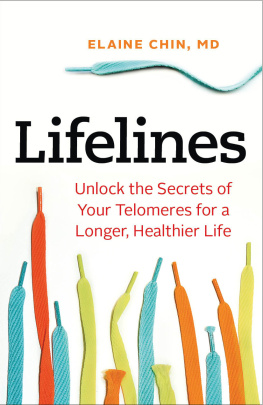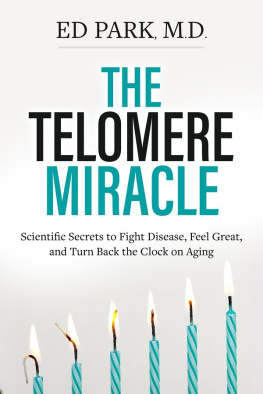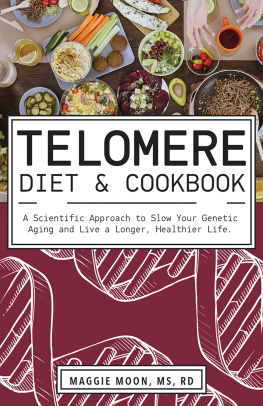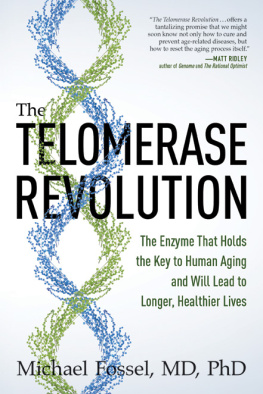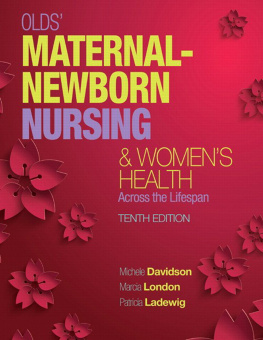This book is designed to help you understand the new science of telomeres and to help you make informed lifestyle choices; it is not meant to replace formal medical treatment by a physician or other licensed health care provider. You should regularly consult a physician in matters relating to your health and particularly with respect to any symptoms that may require diagnosis or medical attention.
Cover copyright 2017 by Hachette Book Group, Inc.
Hachette Book Group supports the right to free expression and the value of copyright. The purpose of copyright is to encourage writers and artists to produce the creative works that enrich our culture.
The scanning, uploading, and distribution of this book without permission is a theft of the authors intellectual property. If you would like permission to use material from the book (other than for review purposes), please contact permissions@hbgusa.com. Thank you for your support of the authors rights.
Grand Central Publishing is a division of Hachette Book Group, Inc. The Grand Central Publishing name and logo is a trademark of Hachette Book Group, Inc.
The publisher is not responsible for websites (or their content) that are not owned by the publisher.
The Hachette Speakers Bureau provides a wide range of authors for speaking events. To find out more, go to www.hachettespeakersbureau.com or call (866) 376-6591.
Elizabeth Blackburn and Elissa Epel have discovered that telomeres, the capping structure at the end of your DNA that make up your chromosomes, do not simply carry out the commands issued by your genetic code. Telomeres are listening to you. They absorb the instructions you give them. They respond to you being stressed and to your being relaxed, to your being sad or your being happy. Thus, telomeres contribute to the state of your brain, to your mood, to the speed of your aging, and to your risk for neurodegenerative diseases. In other words, we can change the way we age at the most elemental cellular level. So if you want to keep your brain sharp, you have to know about your telomeres and stay in touch with them. This book shows you how you can do this, and it does so in a way that is both intellectually exhilarating yet easily accessible to all. This book will become a classic. It is one of the most exciting books in biology to emerge in the last decade.
Eric Kandel, Nobel laureate, author of In Search of Memory: The Emergence of a New Science of Mind
Improving public health requires that people know the truth about their own lives. Blackburn and Epel reveal the discovery of how cells age and how certain forces in our lives cause us to get sick and age prematurely. The Telomere Effect explains the often-invisible things that affect all of our lives, giving us a fresh new level of awareness and helping us make better choices individually and socially for greater health and longevity. In short, it will change the way we think of aging and disease.
David Kessler, MD, former FDA commissioner, author of the New York Times bestseller The End of Overeating and Capture
Using both science and personal stories, Blackburn and Epel demonstrate that how we live each day has a profound effect not just on our health and well-being but how we age, as well. Its a manual for how to live younger and longer. Spoiler alert: sleep is a key element. The Telomere Effect is a book that will help you thrive at every level.
Arianna Huffington
Elizabeth Blackburn and Elissa Epel have discovered a revolutionary set of findings that can transform the way we live our lives, shaping the very health of our cells by how we use our minds. These pioneers of well-being unveil a story of the power of our interpersonal connectionsin romance, friendship, and child-parent relationshipsto slow the rate of cell aging.
These powerful discoveries are made useful in your day-to-day life with a wealth of science-based suggestions, which will delight your mind, enrich your day, and improve your health.
Daniel J. Siegel, MD, author of Mindsight and Brainstorm
Blackburn and Epel lay out a road map for thriving as we age by eloquently illuminating the intricate relationships between the psychology and the biology of aging. Drawing on telomere science, they empower and inspire readers to enhance their healthspans. The authors point to realistic possibilities long life affords, in language that is accessible, informative, and highly engaging.
Laura L. Carstensen, PhD, professor of psychology, founding director of the Center on Longevity at Stanford University, author of A Long Bright Future
The Blackburn-Epel dream team has condensed a massive body of complex scientific data into a highly readable, nontechnical how-to manual on strategies that will help anyone who is human: a truly extraordinary gift to all of us who want to enhance our health, no matter at what stage of life we are in.
Rita B. Effros, PhD, professor, David Geffen School of Medicine at UCLA, 2015 president, Gerontological Society of America
The authors of this fascinating book show how the telomeres in our bloodstreams are responsive to many aspects of our daily existence. In these pages, telomeres become the nexus of an important discussion of vulnerability and resilience to influences of our social and physical environment and the important role of the mind-body connection. In our future, it may be that telomere monitoring will help us pursue better healtha new frontier waiting to be explored. Regardless, you will learn a lot that can benefit your healthspan.
Bruce McEwen, PhD, professor of neuroscience, the Rockefeller University, author of The End of Stress as We Know It
Dr. Elizabeth Blackburn is the expert on telomeres, which are the tips that protect our chromosomes and correlate remarkably with health and longevity. Her and Dr. Epels scientific discoveries and their potential importance for our health, both individually and collectively, are profound, and their apparent relationship to stress opens up an exciting array of potential healthy lifestyle changes.
Lee Goldman, MD, chief executive of Columbia University Medical Center, author of Too Much of a Good Thing: How Four Key Survival Traits Are Now Killing Us
The breakthrough research that Drs. Elizabeth Blackburn and Elissa Epel have conducted has created a dramatic shift in our understanding of what is possible in terms of human health and longevity. Telomeres, the ends of your DNA, affect how quickly your cells age and die. As your telomeres get shorter, your life gets clouded with disease.
Drs. Blackburn and Epel are the central researchers in the discovery of telomeres, their profound effect on health, and the myriad ways in which lifestyle choices can improve cellular aging. They have collaborated with researchers worldwide on studies from understanding cell-aging machinery to chemical exposures to mental-training classes aimed to improve cellular health. A study we collaborated on showed, for the first time, that comprehensive lifestyle changes may actually increase the length of our telomeres, thus beginning to reverse aging on a cellular level. This book is revolutionary, transforming the way our world thinks about health and living well, disease, and death. This work reveals a stunning picture of healthy agingits not simply about individuals; its about how we are connected to each other, today and through future generations. It is hard to overstate its importance.


